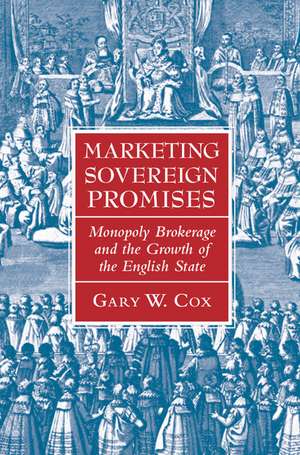Marketing Sovereign Promises: Monopoly Brokerage and the Growth of the English State: Political Economy of Institutions and Decisions
Autor Gary W. Coxen Limba Engleză Paperback – 27 apr 2016
| Toate formatele și edițiile | Preț | Express |
|---|---|---|
| Paperback (1) | 203.78 lei 6-8 săpt. | |
| Cambridge University Press – 27 apr 2016 | 203.78 lei 6-8 săpt. | |
| Hardback (1) | 681.27 lei 6-8 săpt. | |
| Cambridge University Press – 8 mai 2016 | 681.27 lei 6-8 săpt. |
Din seria Political Economy of Institutions and Decisions
-
 Preț: 130.88 lei
Preț: 130.88 lei -
 Preț: 208.93 lei
Preț: 208.93 lei -
 Preț: 231.19 lei
Preț: 231.19 lei -
 Preț: 200.85 lei
Preț: 200.85 lei -
 Preț: 211.84 lei
Preț: 211.84 lei -
 Preț: 231.82 lei
Preț: 231.82 lei -
 Preț: 300.55 lei
Preț: 300.55 lei -
 Preț: 208.14 lei
Preț: 208.14 lei -
 Preț: 177.53 lei
Preț: 177.53 lei -
 Preț: 289.63 lei
Preț: 289.63 lei -
 Preț: 236.43 lei
Preț: 236.43 lei -
 Preț: 259.72 lei
Preț: 259.72 lei -
 Preț: 223.71 lei
Preț: 223.71 lei -
 Preț: 275.89 lei
Preț: 275.89 lei -
 Preț: 279.67 lei
Preț: 279.67 lei -
 Preț: 274.39 lei
Preț: 274.39 lei - 14%
 Preț: 758.09 lei
Preț: 758.09 lei -
 Preț: 228.63 lei
Preț: 228.63 lei -
 Preț: 242.36 lei
Preț: 242.36 lei -
 Preț: 198.98 lei
Preț: 198.98 lei -
 Preț: 225.62 lei
Preț: 225.62 lei -
 Preț: 280.96 lei
Preț: 280.96 lei - 14%
 Preț: 774.55 lei
Preț: 774.55 lei -
 Preț: 259.93 lei
Preț: 259.93 lei - 11%
 Preț: 542.97 lei
Preț: 542.97 lei -
 Preț: 281.33 lei
Preț: 281.33 lei - 11%
 Preț: 686.05 lei
Preț: 686.05 lei -
 Preț: 267.57 lei
Preț: 267.57 lei -
 Preț: 450.58 lei
Preț: 450.58 lei -
 Preț: 274.75 lei
Preț: 274.75 lei -
 Preț: 254.82 lei
Preț: 254.82 lei - 11%
 Preț: 627.35 lei
Preț: 627.35 lei -
 Preț: 281.17 lei
Preț: 281.17 lei -
 Preț: 242.75 lei
Preț: 242.75 lei - 11%
 Preț: 677.83 lei
Preț: 677.83 lei -
 Preț: 281.74 lei
Preț: 281.74 lei - 11%
 Preț: 628.83 lei
Preț: 628.83 lei - 11%
 Preț: 622.48 lei
Preț: 622.48 lei -
 Preț: 265.50 lei
Preț: 265.50 lei -
 Preț: 260.31 lei
Preț: 260.31 lei
Preț: 203.78 lei
Nou
Puncte Express: 306
Preț estimativ în valută:
38.100€ • 40.51$ • 32.39£
38.100€ • 40.51$ • 32.39£
Carte tipărită la comandă
Livrare economică 04-18 februarie 25
Preluare comenzi: 021 569.72.76
Specificații
ISBN-13: 9781316506097
ISBN-10: 1316506096
Pagini: 232
Ilustrații: 21 b/w illus. 14 tables
Dimensiuni: 152 x 228 x 14 mm
Greutate: 0.32 kg
Editura: Cambridge University Press
Colecția Cambridge University Press
Seria Political Economy of Institutions and Decisions
Locul publicării:New York, United States
ISBN-10: 1316506096
Pagini: 232
Ilustrații: 21 b/w illus. 14 tables
Dimensiuni: 152 x 228 x 14 mm
Greutate: 0.32 kg
Editura: Cambridge University Press
Colecția Cambridge University Press
Seria Political Economy of Institutions and Decisions
Locul publicării:New York, United States
Cuprins
1. Sovereign credibility and public revenue; Part I. The Glorious Revolution and the English State: 2. The market for taxes and platforms; 3. More credible platforms, more taxes; 4. Pricing sovereign debts; 5. Establishing monopoly brokerage of sovereign debts; 6. The consequences of monopoly brokerage of debt; 7. Property rights; 8. From constitutional commitment to Industrial Revolution; 9. Summarizing the Revolution; Part II. The English Constitutional Diaspora: 10. Exporting the Revolution - the early adopters; 11. Exporting the Revolution - the late adopters; 12. Good political institutions.
Recenzii
'Seventeenth-century British public finance stands at the intersection of several fields of scholarship - economics, political science, and history - and research on it lies at the foundation of contemporary political economy. In this important work, Gary W. Cox revisits the topic and offers an interpretation of his own. The book is pure Cox: deeply researched, closely argued, and profound - political economy done right.' Robert H. Bates, Harvard University, Massachusetts
'This is a major contribution to institutional economics, the application of those methods to understanding British political development, the comparative history of fiscal constitutions, and an interesting extension of arguments about the Industrial Revolution.' Michael Braddick, Sheffield University
'Cox combines attention to history with carefully laid out models of political economy to understand just how England arrived at limited government. This is the most important book in historical political economy in the last decade.' Jean-Laurent Rosenthal, California Institute of Technology
'Cox provides us with an important new analysis of a critical historical episode, the growth of parliamentary responsibility in Britain, its economic consequences, and the diffusion of this practice to other countries. He adds greatly to our understanding of how the modern state came to be.' David Stasavage, New York University
'Summing Up: Recommended. Upper-division undergraduates through faculty.' B. B. Andrew, Choice
'This is a major contribution to institutional economics, the application of those methods to understanding British political development, the comparative history of fiscal constitutions, and an interesting extension of arguments about the Industrial Revolution.' Michael Braddick, Sheffield University
'Cox combines attention to history with carefully laid out models of political economy to understand just how England arrived at limited government. This is the most important book in historical political economy in the last decade.' Jean-Laurent Rosenthal, California Institute of Technology
'Cox provides us with an important new analysis of a critical historical episode, the growth of parliamentary responsibility in Britain, its economic consequences, and the diffusion of this practice to other countries. He adds greatly to our understanding of how the modern state came to be.' David Stasavage, New York University
'Summing Up: Recommended. Upper-division undergraduates through faculty.' B. B. Andrew, Choice
Notă biografică
Descriere
This book offers a new theory of state growth, based on the creation of credible and prudent state budgets.













